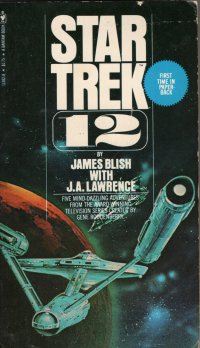 I was mistaken in October 2022 (That long ago? Already?) when I’d said I’d finish Star Trek 13 sometime and turn my attention to the Star Trek: The Animated Series books by Alan Dean Foster. This volume is the final one in the original set, and Blish died while working on it (his widow, J.A. Lawrence, finished it). I also thought that Star Trek 11 was the last in the set that I had on my to-read shelves as I’d grouped them as I went along before reading them, but I found this paperback when scouring the stacks for books for the Winter Reading Challenge, and I figured it would be a good, quick book to start off my post-Winter Reading Challenge reading.
I was mistaken in October 2022 (That long ago? Already?) when I’d said I’d finish Star Trek 13 sometime and turn my attention to the Star Trek: The Animated Series books by Alan Dean Foster. This volume is the final one in the original set, and Blish died while working on it (his widow, J.A. Lawrence, finished it). I also thought that Star Trek 11 was the last in the set that I had on my to-read shelves as I’d grouped them as I went along before reading them, but I found this paperback when scouring the stacks for books for the Winter Reading Challenge, and I figured it would be a good, quick book to start off my post-Winter Reading Challenge reading.
The book has five stories based on episodes, and they felt rather familiar, but perhaps I remember them from reading Star Trek Memories two years ago–I think it had some summaries of the plots of the shows.
Stories/episodes include:
- “Patterns of Force”, the one where the Enterprise crew visits a planet where a peaceable Federation researcher has somehow become a Fuhrer figure to a militant society looking to eliminate people from the next planet over.
- “The Gamesters of Triskelion”, the one where an Enterprise’s away team is snatched during transport to a distant planet where they’ll be trained to act as gladiators that the Gamesters can wager on.
- “And the Children Shall Lead”, the one where the Enterprise comes to a research outpost to find that the adults are dead and the children are unconcerned; when the crew brings the children aboard, they start to take over at the behest of an alien force.
- “The Carbomite Maneuver”, the one where the Enterprise goes to the edges of known space and encounters a stronger alien presence that wants to defend itself by destroying the Enterprise until Kirk explains about the Carbomite.
- “Shore Leave”, the one where an overworked Enterprise crew finds a planet that seems to bring the crew’s memories and thoughts to life–for good and for bad.
Blish (and his wife) got better as he (they) went along with these books, where they could not only write from relatively fresh scripts but from the actual aired episodes, so they match (and perhaps make) our memories. You know, when I initially read these books in the 1980s, I probably had not seen many of the episodes. I mean, Star Trek was fairly common on the weekends in syndication, so I took it for granted. So many of the episodes that I’ve later seen–and infrequently at that, now that I think about it–I would have seen after reading these books.
So fifty years after he passed away, I have to salute James Blish for his work. He was not a midlister who filled a void for science fiction fans–television science fiction fans, perhaps–but, as I’ve said, until Star Trek: The Motion Picture came out (and, honestly, until The Wrath of Khan or maybe Star Trek: The Next Generation came out), this is what we had to make do with in those pioneer days before streaming, before cable. I suspect Laura Ingalls Wilder read these books on the prairies. Well, not quite, but…. Yeah, kids these days would not enjoy these books as much as I have decades and a half-century later.


